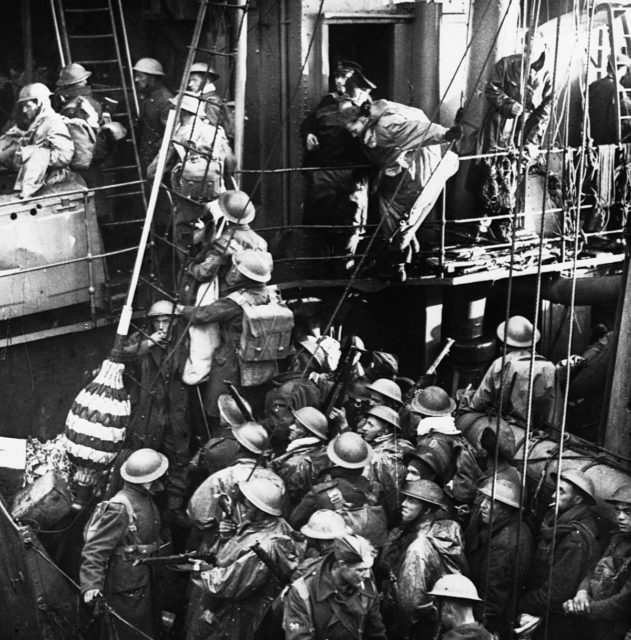The Soldier who survived on his own in Dunkirk for four months
Over May and June 1940, a major evacuation of Allied troops was taking place on the beaches of Dunkirk. Known as Operation Dynamo, an armada of military and civilian vessels crossed the English Channel and successfully evacuated 340,000 troops.
However, it was no walk in the park. The British Expeditionary Force had left behind hundreds of thousands of tons of equipment, vehicles, and supplies, and the evacuation efforts were continuously harassed by German air attacks, claiming the lives of many Allied troops.
Additionally, while many escaped, the Germans still managed to capture a huge number of prisoners, about one for every seven Dunkirk escapees.
Bill Lacey

One member of the BEF caught up in the frantic activities backed up against the Channel was 20-year-old Bill Lacey. Lacey was a rifleman in the Gloucestershire Regiment, and, like thousands of others, was trying to get a ride home. Unfortunately, things for him would not be so simple.
Lacey had managed to get himself onto an evacuating boat, but when a wounded man came aboard, he gave him his space. He leaped off the boat and headed back to shore, watching as his ticket home floated away.
Before the evacuation, Lacey had already fought and escaped death on a few occasions. He had even killed a German soldier with his bayonet. But on the beach of Dunkirk, with no way home, he knew he was in trouble.
As the last boats left, German troops started overflowing onto the beach, killing or capturing the remaining stragglers. In a split-second decision, Lacey decided his best chances of survival were to run.
According to an article by the Mirror, Lacey said about his actions at that moment: “I could see German troops pouring on to the beach, so I ran in the opposite direction, towards the roadway, then crossed into a patch of woodland. My only plan was to head south in the hope that I might find British troops there.”
He headed deep into the woods and discarded his weapon, as he believed they would have been of little use. Aware that wandering around the French countryside in a British Army uniform was not very wise, Lacey threw it away and stole civilian clothes.
After his escape, Lacey’s priority became survival.
He had to blend in with the rural French population and stay out of sight wherever possible. If a local interacted with him, he simply nodded. He sourced food from anywhere he could find it, like houses and directly from the land, and he drank from streams.
Lacey mastered the skill of breaking into people’s houses and taking what he could.
“I discovered that in the countryside no one had locks on their kitchen doors. You just needed to be extremely careful, because the heavy latches that the French used made a terrible clunk as they opened.” Lacey said. “I would have to freeze in the dark, waiting to hear if I had woken anyone. Then I would grab what I could – bread, cheese, milk, anything baking in the oven – and run for it.”
While this helped, his fight for survival took its toll on his body, and his weight dropped to about 100 pounds (seven stone).
“Sometimes I would go days without food,” he explained. “Once I found what I thought was a tin of beef. When I forced it open it was just margarine. At that moment, I started to weep. Maybe that was my lowest point. But it passed. I spread the margarine across a handful of straw, and ate that.”
Only moving at night, he narrowly avoided German patrols. On one occasion, a German sniffer dog discovered Lacey under a pile of leaves. Luckily, the dog’s handlers ignored its curiosity long enough for it to become bored and walk away.
After four tough months of survival and under the constant fear of capture, Lacey discovered a small fishing boat moored up on the French coast. He was raised in a seaside town in Devon, so commandeering a boat was a valid option. Once darkness came he climbed into the boat and set sail for England.
At the break of dawn, Lacy arrived on the English shore near Dover. He had made it.
The frail and extremely underweight soldier was discovered and arrested. At a military base, Lacey explained his story, but intelligence officers understandably did not believe his claims. It wasn’t until they read French newspapers from the area that detailed a mysterious foreign soldier moving around the countryside and stealing that they finally believed his story.
More From Us: ‘Dunkirk’ Director Christopher Nolan To Direct Film About J. Robert Oppenheimer, The ‘Father of the Atomic Bomb’
Not only did they believe him, but they were also very impressed by his stories of survival, and offered him a position in the Special Forces. He would remain in the military until the 1950s.
Bill Lacey, the last man out of Dunkirk, died in 2011 at the age of 91.
Post a Comment
0 Comments